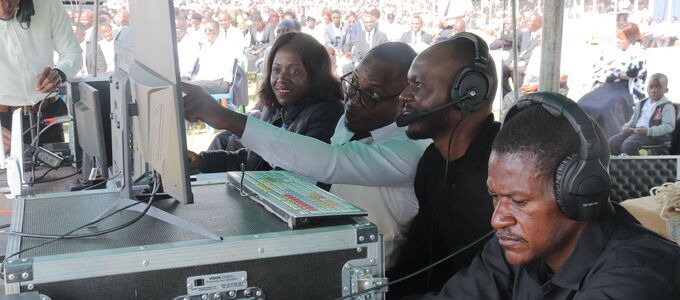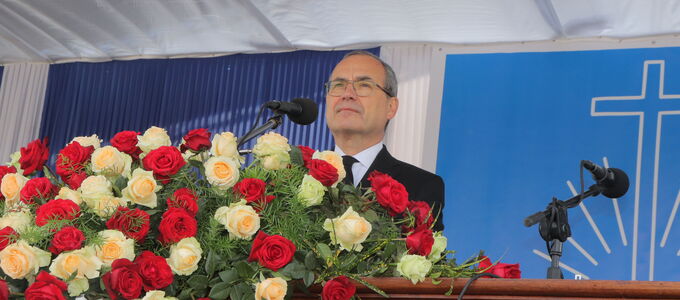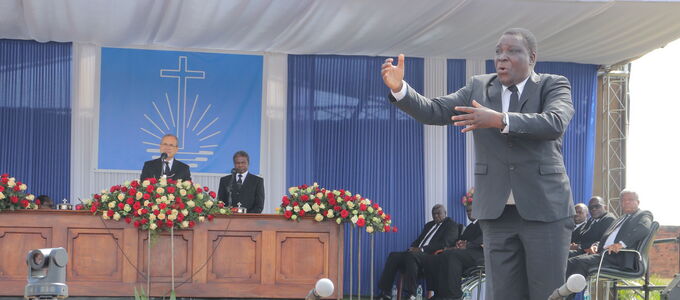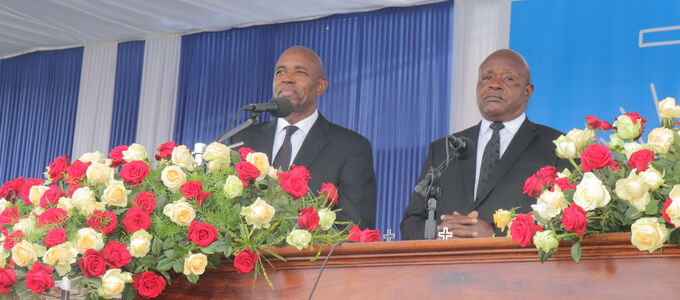Paving the way—for all
Those who practise the Christian faith will not only be concerned about their own salvation. After all, Jesus wants to help all human beings. And “the more His wish, the more His desire, grows in us, the more we too will want to contribute to the salvation of our neighbour,” said the Chief Apostle.
The divine service that the Chief Apostle conducted on 30 June 2024 in Mzuzu, Malawi was transmitted throughout the entire District Apostle area of Zambia-Zimbabwe-Malawi. It was based on a Bible text from Isaiah 62: 10: “Go through, go through the gates! Prepare the way for the people; build up, build up the highway! Take out the stones, lift up a banner for the peoples!”
Jerusalem as an image for the church
After several years of exile, the captives who had been taken away were permitted to return to Jerusalem. The prophet at the time called upon the people who had remained in Jerusalem to prepare the way, or to make the way easier, for the exiles: “They were to lift up their banner to show them the way, to show them that this was the place to go. And they were to take the stones out of the way for them in order to make their passing easier.”
“The city of Jerusalem is an image for the place, the church, where God dwells with His people, where one can encounter God in order to have fellowship with Him,” explained the Chief Apostle. “It is the duty of the believers here to make this fellowship possible,” he added.
The Chief Apostle went on to reference the parable of the Prodigal Son, which describes God’s position toward the sinner: when the son decided to return home, his father was not only waiting for him in the house, but rather went out to him, to welcome him and to embrace him. “This is also an image for the attitude the believers should have,” he said. “Show some concern for the salvation of your neighbour! Do not be selfish!”
In the past it was common practice for rulers to raise their banners to show that they were in control of a particular area. And so it was that Chief Apostle Schneider called upon the believers to lift up their banners to show that it is God who rules in this place.
Make a mark
“Think about the salvation of your neighbour. Go out and go to them. Show them the way. Lift up your banner so that they know that this is the place they need to go. For example, such a banner might take the form of our enduring gratitude toward God. That is one of the ways we can show our fellow human beings that there is still salvation even in difficult times.
“Our daily conduct is the banner that displays His salvation,” said Chief Apostle Schneider. Followers of Christ endeavour to overcome evil with goodness: “Do not allow others to influence your behaviour. Even if they do something wrong, let us do the right thing.”
The love and unity of our fellowship is another such sign to which Jesus referred: “Love one another—because if you love one another, people will see that you are true disciples of Jesus Christ.” These banners, these signs, can show people the way that leads to God.
Moving obstacles out of the way
In addition, the inhabitants of the city were to move the stones out of the way. “Let us move away all obstacles that prevent people from going to church,” he urged.
A huge obstacle for others is “when we try to make the become as we are, when we try to impose our own rules upon them.” The Chief Apostle called upon the believers to “move the obstacles out of the way! Let us not behave like the prodigal son’s older brother, who was not happy that the father had granted the prodigal son such grace. Let us not behave like the labourers in the vineyard who did not agree that the workers of the final hours should receive the same compensation for their work as those of the first hours. No one can earn grace! Let us not impose our own rules on others. Let us allow God to do good to our neighbour! Let us move these obstacles out of the way!”
Other obstacles for our neighbour may take the form of prejudices, reproaches, or accusations: “How are they supposed to join our Church if they have the feeling that they are not welcome?” In order for our neighbour to be saved, it is important for them to know that there are no accusations or reproaches in their way anymore.
Offering assistance
Nevertheless, there are certain obstacles that cannot be moved out of the way, which must simply be overcome by the individual on the way to God.
One such obstacle is the imperfection of the visible church. Anyone who has ever looked at the members of the Church might justifiably say: “Just look at them. Be realistic! That is a joke!—Just look at the Apostles, the ministers, and the many conflicts in the congregation!” These large stones cannot be moved away since we will always continue to make mistakes until the end, and because human beings will always remain sinners. However, it would help our neighbour to see how we deal with conflicts and mistakes. They are to see how the believers accept and forgive one another despite their failings, and how they themselves ask God for grace.
Another obstacle for our neighbour might be their own weakness: “We tell them: ‘You have to become like Jesus Christ.’ But then they may get the impression that they will never make it, and perhaps feel that it is too difficult.” It can help them when others testify of the grace, love, and patience of Christ.
One last obstacle is how to deal with challenges and self-denial. After all, following Christ is also associated with certain sufferings. In our fellowship we can comfort one another, encourage one another, and be an example in our own dealings with difficult situations.


























